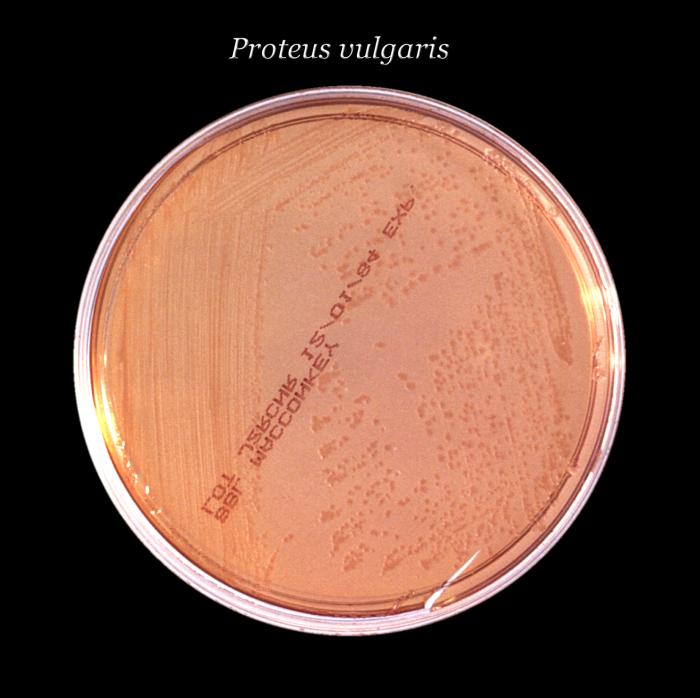- Proteus vulgaris
Taxobox
color = lightgrey
name = "Proteus vulgaris"

image_caption = 24h old culture
regnum = Bacteria
phylum =Proteobacteria
classis = Gamma Proteobacteria
ordo = Enterobacteriales
familia = Enterobacteriaceae
genus = "Proteus"
species = "P. vulgaris"
binomial = "Proteus vulgaris"
binomial_authority = Hauser 1885"Proteus vulgaris" is a
rod-shaped ,Gram negative bacterium that inhabits the intestinal tracts of humans and animals. It can be found in soil, water and faecal matter. It is grouped with theenterobacteriaceae and is an opportunistic pathogen of humans. It is known to causeurinary tract infection s andwound infection s.Notation: Known antibiotics that P. vulgaris is sensitive to:
Ciprofloxacin,Ceftazidime,Netilmicin,Sulbactam or Cefoperazo,Meropenem,Piperacil or Tazobactam,Unasyn.
Antibiotics should be introduced in much higher doses than "normal" when P. vulgaris has infected the sinus or respiratory tissues. I.E.- Ciprofloxacin should be introduced at a level of at least 2000mg per day orally in such a situation, rather than the "standard" 1000mg per day.
According to laboratory conducted fermentation tests, "P. vulgaris" ferments glucose, sucrose, and amygdalin, but does not ferment lactose or mannitol. "P. vulgaris" also tests positive for the Methyl Red (mixed acid fermentation) test and is also an extremely motile organism.
When "P. vulgaris" is tested using the
API 20E Identification System [http://www.rlc.dcccd.edu/mathsci/reynolds/micro/lab_manual/API.html] test strip for Enterobacteriaceae (made byBIOMERIEUX ) [http://www.biomerieux-usa.com/clinical/microbiology/api/apiproducts.htm] , it is discovered that it provides a positive result for: sulfur reduction, urease production, tryptophan deaminase production, and indole production, and provides a negative result for the remainder of the tests on the testing strip.It is referenced in the
Analytical Profile Index using the seven-digit code: 0474021The optimal growing conditions of this organism is in a facultative anaerobic environment with an average temperature of about 23 degrees Celsius .
The term
Proteus signifies changeability of form, as personified in the Homeric poems in Proteus, "the old man of the sea," who tends the sealflocks of Poseidon and has the gift of endless transformation. The first use of the term “Proteus” in bacteriological nomenclature was made by Hauser (1885) who described under this term three types of organisms which he isolated from putrefied meat. One of the three species Hauser identified was "Proteus vulgaris" so this organism has a long history in Microbiology.Over the past two decades the genus "Proteus", and in particular "P. vulgaris", has undergone a number of major taxonomic revisions. In 1982, "P. vulgaris" was separated into three biogroups on the basis of
indole production. Biogroup one was indole negative and represented a new species: "P. penneri"; while biogroup two and three remained together as "P. vulgaris".
Wikimedia Foundation. 2010.
